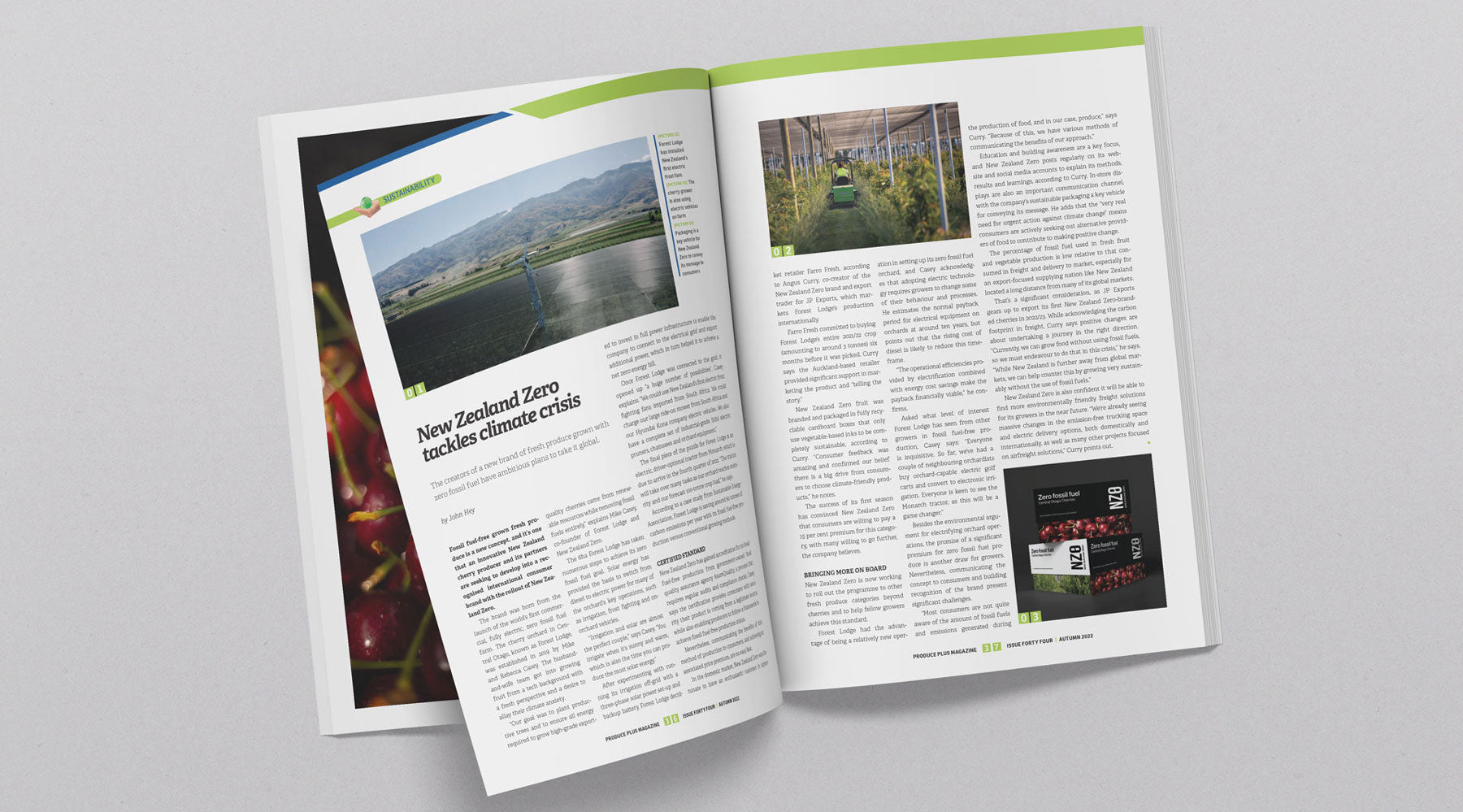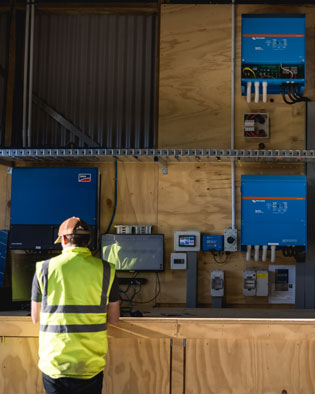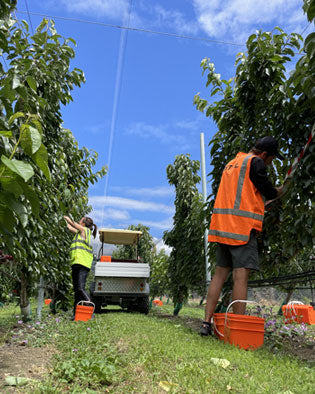
Produce Plus Article. ’New Zealand Zero tackles Climate Crisis’
Continuing our recent media run, NZ0 was recently featured in the ‘Produce Plus’ Magazine. An in-depth article, there were several key topics covered including the initial push and exploration/learnings from our pilot orchard, Forest Lodge, NZ0 certification and the carbon footprint in freight.
There is also mention of how some of these electrification aspects are sympathetic together. NZ0 CEO Mike Casey mentioned that “Irrigation and solar are almost the perfect couple,” says Casey. “You irrigate when it’s sunny and warm, which is also the time you can produce the most solar energy.”
It’s these approaches and considerations that often are not considered in the context of renewable energy and agriculture and is what NZ0 is actively trying to innovate and bring to the industry. In doing so we are striving to prove that these new, climate conscious approaches can equal, if not better traditional approaches and methods.

The article also discusses and acknowledges the carbon footprint in freight and NZ0’s commitment to transparency in this matter with the certification (currently) only being able to apply to no fossil fuel use on the orchards/farms.
“Currently, we can grow food without using fossil fuels, so we must endeavour to do that in this crisis,” he says. “While New Zealand is further away from global markets, we can help counter this by growing very sustainably without the use of fossil fuels.” New Zealand Zero is also confident it will be able to find more environmentally friendly freight solutions for its growers in the near future. “We’re already seeing massive changes in the emission-free trucking space and electric delivery options, both domestically and internationally, as well as many other projects focused on airfreight solutions.”
For the full article, see below or download via the link.
New Zealand Zero tackles climate crisis
The creators of a new brand of fresh produce grown with zero fossil fuel have ambitious plans to take it global. By John Hey
Fossil fuel-free grown fresh produce is a new concept, and it’s one that an innovative New Zealand cherry producer and its partners are seeking to develop into a recognised international consumer brand with the rollout of New Zealand Zero.
The brand was born from the launch of the world’s first commercial, fully electric, zero fossil fuel farm. The cherry orchard in Central Otago, known as Forest Lodge, was established in 2019 by Mike and Rebecca Casey. The husband and- wife team got into growing fruit from a tech background with a fresh perspective and a desire to allay their climate anxiety.
“Our goal was to plant productive trees and to ensure all energy required to grow high-grade export-quality cherries came from renewable resources while removing fossil fuels entirely,” explains Mike Casey, co-founder of Forest Lodge and New Zealand Zero.
The 6ha Forest Lodge has taken numerous steps to achieve its zero fossil fuel goal. Solar energy has provided the basis to switch from diesel to electric power for many of the orchard’s key operations, such as irrigation, frost fighting and on orchard vehicles.
“Irrigation and solar are almost the perfect couple,” says Casey. “You irrigate when it’s sunny and warm, which is also the time you can produce the most solar energy.”
After experimenting with running its irrigation off-grid with a three-phase solar power set-up and backup battery, Forest Lodge decided to invest in full power infrastructure to enable the company to connect to the electrical grid and export additional power, which in turn helped it to achieve a net zero energy bill.
Once Forest Lodge was connected to the grid, it opened up “a huge number of possibilities”, Casey explains. “We could use New Zealand’s first electric frost fighting fans imported from South Africa. We could charge our large ride-on mower from South Africa and our Hyundai Kona company electric vehicles. We also have a complete set of industrial-grade Stihl electric pruners, chainsaws and orchard equipment.”
The final piece of the puzzle for Forest Lodge is an electric, driver-optional tractor from Monarch, which is due to arrive in the fourth quarter of 2022. “The tractor will take over many tasks as our orchard reaches maturity and our forecast 100-tonne crop load,” he says.
According to a case study from Sustainable Energy Association, Forest Lodge is saving around 80 tonnes of carbon emissions per year with its fossil fuel-free production versus conventional growing methods.
CERTIFIED STANDARD
New Zealand Zero has gained accreditation for its fossil fuel-free production from government-owned food quality assurance agency AsureQuality, a process that requires regular audits and compliance checks. Casey says the certification provides consumers with security their product is coming from a legitimate source, while also enabling producers to follow a framework to achieve fossil fuel-free production status.
Nevertheless, communicating the benefits of this method of production to consumers, and achieving an associated price premium, are no easy feat.
In the domestic market, New Zealand Zero was fortunate to have an enthusiastic customer in upmarket retailer Farro Fresh, according to Angus Curry, co-creator of the New Zealand Zero brand and export trader for JP Exports, which markets Forest Lodge’s production internationally.
Farro Fresh committed to buying Forest Lodge’s entire 2021/22 crop (amounting to around 3 tonnes) six months before it was picked. Curry says the Auckland-based retailer provided significant support in marketing the product and “telling the story.”
New Zealand Zero fruit was branded and packaged in fully recyclable cardboard boxes that only use vegetable-based inks to be completely sustainable, according to Curry. “Consumer feedback was amazing and confirmed our belief there is a big drive from consumers to choose climate-friendly products,” he notes.
The success of its first season has convinced New Zealand Zero that consumers are willing to pay a 15 per cent premium for this category, with many willing to go further, the company believes.
BRINGING MORE ON BOARD
New Zealand Zero is now working to roll out the programme to other fresh produce categories beyond cherries and to help fellow growers achieve this standard.
Forest Lodge had the advantage of being a relatively new operation in setting up its zero fossil fuel orchard, and Casey acknowledges that adopting electric technology requires growers to change some of their behaviour and processes. He estimates the normal payback period for electrical equipment on orchards at around ten years, but points out that the rising cost of diesel is likely to reduce this timeframe.
“The operational efficiencies provided by electrification combined with energy cost savings make the payback financially viable,” he confirms.
Asked what level of interest Forest Lodge has seen from other growers in fossil fuel-free production, Casey says: “Everyone is inquisitive. So far, we’ve had a couple of neighbouring orchardists buy orchard-capable electric golf carts and convert to electronic irrigation. Everyone is keen to see the Monarch tractor, as this will be a game changer.”
Besides the environmental argument for electrifying orchard operations, the promise of a significant premium for zero fossil fuel produce is another draw for growers. Nevertheless, communicating the concept to consumers and building recognition of the brand present significant challenges.
“Most consumers are not quite aware of the amount of fossil fuels and emissions generated during the production of food, and in our case, produce,” says Curry. “Because of this, we have various methods of communicating the benefits of our approach.”
Education and building awareness are a key focus, and New Zealand Zero posts regularly on its website and social media accounts to explain its methods, results and learnings, according to Curry. In-store displays are also an important communication channel, with the company’s sustainable packaging a key vehicle for conveying its message. He adds that the “very real need for urgent action against climate change” means consumers are actively seeking out alternative providers of food to contribute to making positive change.
The percentage of fossil fuel used in fresh fruit and vegetable production is low relative to that consumed in freight and delivery to market, especially for an export-focused supplying nation like New Zealand located a long distance from many of its global markets.
That’s a significant consideration, as JP Exports gears up to export its first New Zealand Zero-branded cherries in 2022/23. While acknowledging the carbon footprint in freight, Curry says positive changes are about undertaking a journey in the right direction. “Currently, we can grow food without using fossil fuels, so we must endeavour to do that in this crisis,” he says. “While New Zealand is further away from global markets, we can help counter this by growing very sustainably without the use of fossil fuels.”
New Zealand Zero is also confident it will be able to find more environmentally friendly freight solutions for its growers in the near future. “We’re already seeing massive changes in the emission-free trucking space and electric delivery options, both domestically and internationally, as well as many other projects focused on airfreight solutions,” Curry points out.



